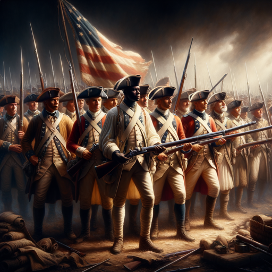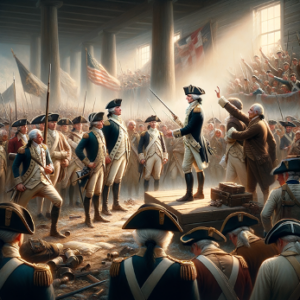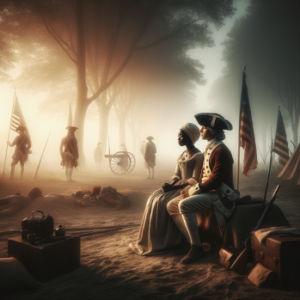The Revolutionary War: New Jersey’s Role in the Fight for Independence
The American Revolutionary War was the culmination of a series of events and growing tensions between the American colonies and British rule. New Jersey, like many other colonies, experienced a unique set of circumstances and developments that contributed to the revolutionary fervor and desire for independence.
Political Climate in New Jersey
In the years leading up to the Revolutionary War, New Jersey was a crucial battleground for political ideas and sentiments that would fuel the push for independence. The colony was home to a diverse population, including settlers of Dutch, English, and German descent, which resulted in a variety of viewpoints regarding governance and allegiance. The political structure in New Jersey allowed for a relatively high degree of self-governance, particularly with the establishment of the New Jersey Assembly in 1702. However, this autonomy was increasingly threatened by British imperial policies, leading to a growing discontent among colonists.
Tensions with British Rule
The increasing assertiveness of British authority began to manifest through a series of unpopular taxes and regulations that were seen as unjust and overreaching. Among these were:
- The Stamp Act of 1765: This was one of the first direct taxes imposed on the colonies, requiring the purchase of special stamped paper for legal documents, newspapers, and other publications. In New Jersey, the Stamp Act provoked strong resistance. Protests and boycotts erupted, and the New Jersey Assembly passed resolutions condemning the act, emphasizing the principle of “no taxation without representation.”
- The Townshend Acts of 1767: These acts imposed taxes on imported goods such as glass, paper, and tea. The response in New Jersey included organized boycotts and public demonstrations. The New Jersey Assembly’s commitment to resisting these taxes reinforced the colony’s move toward unified colonial action.
- The Intolerable Acts of 1774: Following the Boston Tea Party, the British government enacted punitive measures aimed at Massachusetts. New Jersey sympathized with the plight of its neighbor and joined in the broader colonial response, leading to the establishment of the First Continental Congress, which included New Jersey delegates.
The Growing Desire for Independence
As the tensions escalated, the desire for independence began to crystallize among New Jersey’s colonists. Influential thinkers and writers, such as Thomas Paine, began to circulate revolutionary ideas that emphasized natural rights and self-governance. Paine’s “Common Sense,” published in early 1776, resonated deeply with New Jersey residents and galvanized support for independence.
In addition to intellectual discourse, grassroots movements began to take shape. Local Committees of Correspondence were established, providing a network for communication and coordination among colonists. By late 1775, New Jersey had a significant number of patriots actively working against British rule, including the formation of militia groups.
Key Events in New Jersey
New Jersey was not just a passive participant in the events leading up to the Revolutionary War; it was a focal point for several notable incidents:
- The Battle of Trenton (1776): Following the Declaration of Independence, New Jersey became a strategic battleground. George Washington’s surprise attack on Trenton after crossing the Delaware River turned the tide for the Continental Army and inspired many in New Jersey to support the revolutionary cause.
- The Battle of Princeton (1777): This battle further solidified New Jersey’s central role in the revolution. The victory helped to bolster morale among American forces and rallied support for independence among the local populace.
Conclusion
The events leading up to the Revolutionary War transformed New Jersey from a colony under British rule to a center of revolutionary activity. The combination of political unrest, opposition to British taxation, and the influence of revolutionary ideas created a fertile ground for the desire for independence. As New Jerseyers rallied for their rights and freedoms, they participated in shaping a new nation, laying the groundwork for a future defined by democratic ideals and self-determination. The struggle in New Jersey not only mirrored the broader conflict across the colonies but also highlighted the local dimensions of a revolution that would ultimately change the course of history.

The Geographic Importance of New Jersey
New Jersey’s unique geography positioned it as a critical battleground during the American Revolutionary War. Located between the major cities of New York and Philadelphia, the state’s landscape was characterized by a mix of urban centers, rural farmlands, and strategic waterways. This geographic advantage made New Jersey an essential conduit for the movement of troops and supplies, influencing the tactics and strategies employed by both British and American forces.
A Strategic Transit Point
New Jersey served as a vital transit point for military operations due to its proximity to key cities and transportation routes. The state’s extensive network of rivers and roads facilitated the rapid mobilization of troops and logistics. The Delaware River, in particular, allowed for the movement of supplies and soldiers between Pennsylvania and New Jersey. Control of this river was crucial, as it provided access to both the Continental Army in Pennsylvania and the British forces stationed in New York.
The British recognized the importance of New Jersey early in the war, launching a series of military campaigns aimed at securing the region. They understood that by controlling New Jersey, they could effectively cut off supplies to the Continental Army and maintain a foothold between their strongholds in New York and the key rebel city of Philadelphia.
Battleground for Control
As the war progressed, New Jersey became a battleground where British and American forces continuously clashed for control. The state witnessed significant engagements, including the Battles of Trenton and Princeton, which illustrated its strategic significance. After the initial defeat of the Continental Army, George Washington’s daring maneuvers through New Jersey revitalized the revolutionary cause. The successful surprise attack at Trenton in December 1776 not only marked a turning point but also showcased how the geography of New Jersey could be leveraged to gain tactical advantages.
Additionally, the terrain of New Jersey—a mix of hills, forests, and open fields—allowed for various forms of military engagement. The British often attempted to maneuver through this complex landscape to outflank American positions, while the Continental Army utilized the terrain to conduct guerrilla tactics and ambushes, maximizing their own strategic advantages despite often being outnumbered.
Supply Lines and Logistics
The role of New Jersey as a logistics hub was underscored by its agricultural resources, which were crucial for sustaining troops. The fertile farmlands provided food and supplies necessary for the Continental Army, while local militias played a vital role in protecting these resources from British raids. The state’s towns became supply depots, where arms, food, and reinforcements could be marshaled for various campaigns.
Moreover, New Jersey’s population was deeply involved in the war effort. Local communities rallied to support the Continental Army by providing essential goods and services. The inhabitants often faced the dual challenge of defending their homes while supporting the larger revolutionary cause, making the state not only a battleground but also a center of logistical support.
Conclusion
In summary, New Jersey’s geographic importance during the Revolutionary War cannot be overstated. Its strategic location as a transit point for troops and supplies, coupled with its varied landscape, made it a focal point of military operations. As both British and American forces recognized the necessity of controlling this pivotal region, New Jersey transformed into a crucial battleground that played a significant role in the outcome of the war. Through its unique geography, New Jersey not only influenced military strategies but also shaped the fate of the emerging nation.

The Battle of Trenton: A Turning Point in the Revolutionary War
The Battle of Trenton, fought on the morning of December 26, 1776, marked a crucial juncture in the American Revolutionary War, particularly for the morale and strategy of the Continental Army. Following a series of disheartening defeats, including the loss of New York City, General George Washington faced dwindling support and a demoralized army. The harsh winter, combined with a series of setbacks, led many soldiers to contemplate returning home as their enlistments neared expiration.
The Events of December 1776
In the days leading up to the battle, Washington devised a bold plan to revitalize the revolutionary cause and inspire his troops. On Christmas night, he led a contingent of approximately 2,400 men across the icy Delaware River, braving not only the frigid temperatures but also adverse weather conditions, including snow and sleet. This audacious maneuver was aimed at surprising the Hessian forces stationed in Trenton, who were known for their complacency during the holiday season.
Upon landing in New Jersey, Washington’s troops marched approximately nine miles in the predawn hours, arriving at Trenton just after sunrise. The Hessians, taken completely by surprise and unprepared for an attack, found themselves quickly overwhelmed. Within a matter of hours, the Continental Army secured a decisive victory, capturing over 900 Hessian soldiers with minimal American casualties.
Impact on American Morale and Strategy
The victory at Trenton had significant ramifications for the American revolutionary movement. Firstly, it provided an immediate boost to the morale of Washington’s troops and supporters of the independence cause. The successful surprise attack not only reinvigorated the soldiers but also bolstered public sentiment in favor of the Revolution. Newspapers heralded the victory, and recruitment efforts gained momentum as the tide began to turn in favor of the Continental Army.
Strategically, the Battle of Trenton shifted the perception of Washington’s leadership. His bold decision-making and ability to execute a successful plan against the odds restored confidence among both his troops and the broader populace. This victory was followed by another triumph at the Battle of Princeton just days later, cementing the momentum gained from Trenton and demonstrating that the Continental Army was capable of offensive operations.
These events underscored a crucial pivot in American military strategy. Rather than remaining solely on the defensive, Washington recognized the importance of taking the initiative and exploiting opportunities, even in the face of overwhelming challenges. The successful engagement at Trenton served as a catalyst for future military operations, instilling a renewed sense of purpose and resilience within the Continental Army as they continued to fight for independence.
In summary, the Battle of Trenton was not merely a military victory; it was a pivotal moment that transformed the Revolutionary War’s trajectory. By reinvigorating the morale of the Continental Army and altering their strategic approach, Washington’s daring attack became a symbol of hope and determination in the struggle for American independence.

The Battle of Princeton: A Follow-Up Victory
The Battle of Princeton, fought on January 3, 1777, was a significant follow-up to George Washington’s earlier victory at the Battle of Trenton, and it played a crucial role in reinforcing Washington’s leadership and commitment to independence. This battle was not only pivotal for the morale of the Continental Army but also demonstrated Washington’s ability to adapt his tactics to achieve victory against a larger, better-equipped British force.
Key Tactics Employed
Washington’s strategic acumen was on full display during the Battle of Princeton. After the triumph at Trenton, where Washington successfully launched a surprise attack on the Hessian forces, he recognized the necessity to maintain the momentum of the Continental Army. The plan for Princeton involved a deceptive maneuver that capitalized on the element of surprise.
- Distraction and Diversion: Washington feigned a retreat from Trenton, leaving behind campfires and other signs of activity to mislead British forces into believing that he was abandoning the area. This ruse drew British troops, led by General Cornwallis, away from Princeton, allowing Washington to move rapidly toward the latter.
- Flanking Maneuver: As Washington’s men approached Princeton, he skillfully executed a flanking maneuver. The Continental Army engaged in a direct confrontation with British forces, utilizing the terrain to their advantage. Washington’s troops were able to hit the British from unexpected angles, causing disarray among their ranks.
- Infantry Engagement: The battle highlighted the effectiveness of the Continental Army’s infantry. Washington relied on well-drilled units, such as the New Jersey militia, who fought fiercely against the British soldiers. This engagement not only showcased the growing discipline of the American forces but also instilled a sense of confidence in the soldiers.
Lasting Implications for the Continental Army
The victory at Princeton had profound implications for the Continental Army and the broader war effort. It helped to rejuvenate the morale of the American forces and the general populace, who had been disheartened by earlier setbacks in the war. The momentum gained from the battles of Trenton and Princeton fostered a sense of hope and determination among the colonists, leading to increased enlistments and support for the revolutionary cause.
Additionally, Washington’s leadership during this period established him as a resilient commander capable of executing bold strategies under pressure. His ability to inspire and unify disparate groups within the army contributed to a more cohesive fighting force, which would be critical in the challenging years ahead.
Ultimately, the victory at Princeton solidified New Jersey’s role as a vital theater in the American Revolutionary War. It marked a turning point that demonstrated the potential of the Continental Army to confront British forces successfully. This success not only reinforced Washington’s commitment to independence but also laid the groundwork for future victories that would ultimately lead to the birth of a new nation.

Washington’s Leadership in New Jersey
George Washington’s leadership in New Jersey during the American Revolutionary War marked a pivotal period for both his personal resolve and the morale of the Continental Army. The months spent in this strategically vital state were defined by critical strategic decisions that not only influenced the immediate military situation but also reinforced Washington’s status as a resilient and credible leader of the American cause.
Strategic Decisions in New Jersey
Washington’s strategic decisions in New Jersey were characterized by audacity and an acute understanding of the psychological dimensions of warfare. Following the disheartening defeat in New York, Washington recognized the necessity of regaining the initiative. His campaign culminated in the daring Christmas night crossing of the Delaware River in 1776, a bold maneuver that caught the Hessian forces in Trenton by surprise. This victory was not merely a tactical win; it served as a crucial morale booster for the American troops and the broader revolutionary movement.
After Trenton, Washington continued to capitalize on his momentum with a swift and successful assault at Princeton. These victories not only solidified his reputation as a capable military leader but also reinvigorated enlistment among soldiers who were previously disheartened by the string of defeats. Washington’s ability to inspire and rally his forces during this critical juncture established a foundation of trust and respect among his troops.
The Fortification of Resolve
Washington’s time in New Jersey was instrumental in fortifying his resolve as a leader. The challenges he faced—an under-resourced army, harsh winter conditions, and the looming threat of British retaliation—demanded not only military skill but also steadfast determination. Washington’s ability to maintain a strategic focus amidst these challenges showcased his leadership qualities and reinforced his belief in the American cause.
His commitment to the defense of New Jersey and the subsequent victories reinforced the notion that the struggle for independence was not futile. This newfound confidence among the American forces was palpable, leading to increased enlistments and support from local populations. Washington’s decisive actions transformed despair into hope, solidifying his credibility as a leader capable of navigating the tumultuous waters of war.
Impact on the Revolutionary Cause
The significance of Washington’s leadership in New Jersey transcended the immediate military outcomes. His victories at Trenton and Princeton served to galvanize support for the revolutionary cause, energizing a populace that had been wavering in its commitment to independence. The strategic importance of New Jersey as a corridor for British supply lines further underscored the need for American control, a goal that Washington adeptly pursued.
In essence, Washington’s time in New Jersey crystallized his role as a unifying figure in the struggle for independence. His decisions and actions during this period not only helped to stabilize the faltering Continental Army but also provided a sense of direction and purpose to a revolution that was still in its nascent stages. Through his leadership, Washington would emerge not only as a military commander but as an emblem of the American fight for freedom, reinforcing the belief that victory was attainable against the formidable British Empire.

Thomas Paine: A Catalyst for Revolutionary Sentiment
Thomas Paine emerged as one of the most influential figures in the movement for American independence, utilizing his writing to sway public opinion and ignite revolutionary fervor across the colonies, including New Jersey. His pamphlets, particularly “Common Sense,” published in January 1776, provided a compelling argument for independence from British rule and articulated the frustrations of many colonists who felt oppressed by unjust governance.
Paine’s “Common Sense” was groundbreaking in its accessibility and directness. In a language that resonated with the everyday colonist, he dismantled the arguments for monarchy and hereditary succession, advocating instead for a democratic republic. This radical idea found a receptive audience in New Jersey, where many were already expressing discontent with British authority. Paine’s emphasis on natural rights and individual liberties struck a chord with New Jerseyans, many of whom sought justification for their growing desire to break free from British control.
The social impact of Paine’s writings extended beyond the intellectual elite. His pamphlets circulated widely, reaching a diverse audience and fostering discussions in taverns, homes, and town meetings throughout the colony. The straightforward arguments laid out by Paine encouraged ordinary citizens to see themselves as active participants in the fight for independence rather than passive subjects under British rule. The call to arms resonated in communities across New Jersey, where residents were inspired to join local militias and participate in the struggle against oppression.
In addition to “Common Sense,” Paine’s later works, including “The Crisis,” further motivated troops and civilians alike. The famous opening line, “These are the times that try men’s souls,” galvanized soldiers and citizens in New Jersey during a period of uncertainty and hardship. His words provided comfort and encouragement, reinforcing the idea that the fight for independence was not only a military endeavor but also a moral imperative.
Paine’s impact on revolutionary sentiment in New Jersey was profound, as he helped to crystallize the thoughts and frustrations of colonists into a unified call for action. The ideas he presented were instrumental in shaping public opinion, turning many who were previously ambivalent toward independence into staunch patriots. As New Jersey moved closer to declaring its independence, Paine’s writings served as both a rallying cry and a foundational text for the emerging revolutionary spirit, ultimately contributing to the larger narrative of the American Revolution.

Guerrilla Warfare in New Jersey
As the Revolutionary War progressed, New Jersey’s strategic location and mixed loyalties provided fertile ground for guerrilla warfare tactics employed by American militias. These tactics were crucial in disrupting British operations, leveraging the element of surprise and the familiarity of local terrain to their advantage.
Militia Organization and Tactics
New Jersey’s militias were often composed of local citizens who took up arms to defend their homes and communities. Drawing on the principles of guerrilla warfare, they employed several tactics:
- Hit-and-Run Attacks: Militia units would engage in small-scale, quick strikes against British supply lines, patrols, and foraging parties. These surprise attacks were designed to inflict casualties and create chaos, forcing British troops to divert resources to protect themselves rather than focusing on larger strategic objectives.
- Ambushes: Utilizing the dense forests and rugged terrain of New Jersey, local militias set ambushes for British troops. For instance, the successful ambush at the Battle of Spring Hill in 1777 demonstrated how New Jersey militiamen could turn the landscape into an ally, using the element of surprise to gain an upper hand against larger, more organized British forces.
- Intelligence Gathering: The local knowledge possessed by militia members proved invaluable. They would gather intelligence on British movements, relay this information to Continental Army leaders, and use it to plan their own operations. The successful intelligence network established by groups like the New Jersey Committee of Safety allowed for better coordination between local militias and the Continental Army.
Specific Instances of Guerrilla Warfare
Several instances stand out where New Jersey’s local militias played a pivotal role in the broader context of guerrilla warfare:
- The Battle of Trenton (1776): While this battle is often credited to the Continental Army, the success of George Washington’s surprise attack was significantly aided by the support of local militias. They provided crucial knowledge of the terrain and assisted in rallying local support, helping to turn the tide in favor of the American forces.
- The Raid on Stony Point (1779): Although this operation was primarily led by the Continental Army, local militias were integral to its success. They utilized guerrilla tactics to surround and secure the area, cutting off British reinforcements and support lines, ultimately contributing to the successful capture of this strategic position.
- Skirmishes in the Pine Barrens: Throughout the war, militias used the Pine Barrens as a base for guerrilla operations. One notable skirmish occurred in 1778, where local militia ambushed a British foraging party, capturing supplies critical to the British army. This operation exemplified how local knowledge and quick, coordinated efforts could thwart larger forces.
- The Battle of Monmouth (1778): During this engagement, New Jersey militias played a supportive role by harassing British positions and providing intelligence to the Continental Army. Their presence not only bolstered the Continental forces but also demonstrated the effectiveness of guerrilla tactics in traditional battles.
Conclusion
The use of guerrilla warfare by New Jersey’s militias was a significant factor in the American Revolutionary War. Their ability to disrupt British operations through ambushes, hit-and-run tactics, and intelligence gathering showcased the effectiveness of local knowledge and citizen participation in the revolutionary effort. These guerrilla tactics not only aided the Continental Army but also helped to foster a sense of unity and purpose among New Jersey’s inhabitants, solidifying their commitment to the cause of independence.

The Role of New Jersey’s Women During the Revolutionary War
As the Revolutionary War unfolded, women in New Jersey emerged as crucial contributors to the war effort, taking on roles traditionally held by men and actively participating in the struggle for independence. Their involvement was multifaceted, encompassing domestic management, support for soldiers, and engagement in political activism.
Managing Homes and Families
With many men enlisted in the Continental Army or local militias, women were often left to manage households and farms alone. This shift required them to adopt new responsibilities, including farming, tending to livestock, and ensuring that families had sufficient provisions. Women not only maintained their homes but also played a vital role in sustaining the local economy, which was increasingly strained by the demands of war. Their ability to adapt to these challenges demonstrated resilience and resourcefulness, as they worked to keep their families safe and fed during times of scarcity.
Supporting Soldiers
Women in New Jersey also provided direct support to soldiers, both on the frontlines and at home. Many volunteered as nurses, caring for the wounded and ill in military camps, while others prepared food and supplies for the troops. They organized fundraising efforts and created clothing and blankets for soldiers, showcasing their commitment to the cause. Notable figures, such as Molly Pitcher, emerged during this time, symbolizing the bravery and dedication of women who accompanied their husbands to battlefields, often taking on roles such as cannoneers and water bearers.
Political Engagement and Activism
The war also prompted women to engage in political discourse and activism. They formed groups to support revolutionary causes, initiating boycotts of British goods and advocating for independence. For instance, the Daughters of Liberty, a group of patriotic women, played a pivotal role in promoting American-made products and reducing reliance on British imports. Their actions extended beyond consumer habits to influence public sentiment and rally support for the revolutionary movement.
Moreover, some women, such as Abigail Adams and Elizabeth Cady Stanton, began to articulate the need for women’s rights and greater social equality. The revolutionary ideals of liberty and justice fostered a new awareness among women regarding their roles and rights within society. This burgeoning consciousness would lay the groundwork for future movements advocating for women’s suffrage and equality.
Evolving Social Roles
The contributions of women during the Revolutionary War catalyzed an evolution in social roles. As women took on responsibilities traditionally assigned to men, their societal status began to shift. The war challenged preconceived notions of gender roles, allowing women to assert their capabilities beyond the domestic sphere. This transformation was not without resistance, but the undeniable contributions of women during this tumultuous period forced society to reconsider their roles and rights.
Conclusion
The impact of New Jersey’s women during the Revolutionary War was profound, as they navigated the challenges of war while actively contributing to the independence movement. Their involvement in managing households, supporting soldiers, and engaging in political activism not only bolstered the war effort but also initiated a gradual change in social perceptions of women’s roles. As New Jerseyers rallied for independence, the contributions of women helped shape the narrative of the revolution, marking a significant chapter in the evolution of women’s rights in America.

The Winter at Morristown: The Harsh Winter of 1779-1780
As the Revolutionary War dragged into its fifth year, the winter of 1779-1780 proved to be one of the most brutal periods for the Continental Army, particularly for the troops stationed at Morristown, New Jersey. Facing extreme weather conditions, dwindling supplies, and the weariness of prolonged conflict, the soldiers endured challenges that tested their resolve and commitment to the cause of independence.
Harsh Conditions
The winter was marked by record low temperatures and heavy snowfall, creating a harsh environment for the Continental Army. Soldiers were ill-equipped for such extreme weather, suffering from inadequate clothing and insufficient shelter. Many troops lacked proper winter garments, leading to frostbite and illness becoming rampant among the ranks. The encampment at Morristown was rife with discomfort, as soldiers huddled in makeshift huts that offered little protection from the biting cold.
The scarcity of food compounded these difficulties. Supply lines from nearby regions were disrupted by the weather and ongoing skirmishes with British forces, leading to severe shortages. Soldiers often faced hunger, with rations reduced to meager portions of bread and occasionally meat. The desperation for sustenance compelled the army to rely heavily on the local populace for support, further straining relations with those who were already grappling with their own hardships.
The Resolve of Soldiers and Locals
Despite the severe trials they faced, the soldiers displayed remarkable resilience. The spirit of camaraderie and a shared commitment to the fight for independence fortified their determination to endure. General George Washington, aware of the dire circumstances, emphasized the importance of perseverance in his communications with both his troops and Congress. His leadership during this trying period helped maintain morale among the men, who drew inspiration from his unwavering dedication to the cause.
The local communities surrounding Morristown played a crucial role in supporting the army. Many residents, motivated by a shared sense of patriotism and duty, opened their homes to offer shelter and food to weary soldiers. Women, in particular, stepped forward to provide assistance, sewing uniforms and knitting blankets for the troops. Their contributions were invaluable, reflecting a deep-rooted commitment to the revolutionary cause.
As the winter wore on, local farmers who had also been affected by the war made sacrifices to provide provisions. Many chose to forgo their own needs to ensure that the soldiers had enough to survive. This mutual support forged a bond between the soldiers and the local populace, highlighting the collective effort required to sustain the fight for independence.
Conclusion
The winter at Morristown epitomized the hardships faced by the Continental Army during the Revolutionary War. The extreme conditions and scarcity of resources tested the resolve of both the soldiers and the local citizens who supported them. Despite the adversity, the determination to persevere and the commitment to the revolutionary cause remained unbroken. This shared struggle laid the groundwork for the enduring spirit of the American Revolution, underscoring the vital interdependence between the military and the civilian population in the quest for liberty.

The Formation of the New Jersey Brigade
In the midst of the Revolutionary War, New Jersey’s proactive stance was exemplified by the formation of the New Jersey Brigade, a distinguished unit that emerged from the fervent desire for independence among the colony’s residents. Organized in 1776, the brigade was composed of volunteers who were driven by a commitment to the revolutionary cause, reflecting the diverse demographics of the state. Men from various backgrounds—farmers, merchants, and artisans—came together, united by their determination to defend their rights against British oppression.
The brigade was initially part of the larger Continental Army and consisted of several regiments, notably the 1st and 2nd New Jersey Regiments. Under the command of capable leaders such as Colonel William Maxwell, the brigade quickly established a reputation for its bravery and resilience.
Contributions to Key Battles and Campaigns
Throughout the war, the New Jersey Brigade played a pivotal role in several key battles, contributing significantly to the overall American war effort. Their participation in critical engagements helped to bolster the morale of the Continental Army and demonstrated the determination of New Jersey’s patriots.
- The Battle of Trenton (1776): Following George Washington’s surprise attack, the New Jersey Brigade was crucial in the subsequent victory, helping to secure the town and rallying local support for the revolutionary cause.
- The Battle of Princeton (1777): The brigade again proved its mettle, engaging in fierce fighting that ultimately led to a significant American victory. This battle not only restored hope to the American forces but also cemented the brigade’s reputation as a formidable fighting unit.
- The Battle of Monmouth (1778): The New Jersey Brigade participated in this large-scale confrontation against British forces, showcasing their ability to stand firm under pressure. The battle was marked by intense combat and fluctuating fortunes, but the brigade’s steadfastness helped to prevent a complete rout of American forces.
- The Sullivan Expedition (1779): As part of a larger campaign to clear British-aligned Iroquois from the New York frontier, the brigade’s involvement illustrated their versatility beyond direct confrontations with British troops. They contributed to the broader effort of securing American interests in the northern theater of the war.
- The Siege of Yorktown (1781): The New Jersey Brigade was also present during the final decisive campaign of the Revolutionary War. Their involvement in the siege was instrumental in the joint American-French efforts that led to the eventual surrender of British General Cornwallis, effectively signaling the decline of British power in America.
Bravery and Significance
The New Jersey Brigade’s bravery was not only displayed in battle but also in their unwavering commitment to the ideals of liberty and self-governance. Their readiness to fight and sacrifice for the cause of independence reflected the broader sentiments of New Jersey’s populace and helped galvanize support for the revolutionary effort.
The significance of the New Jersey Brigade extended beyond the immediate military engagements. Their actions helped to inspire other units and showcased the resolve of the Continental Army. The brigade’s service paved the way for the recognition of New Jersey as a vital contributor to the American Revolution, allowing the state to claim a prominent place in the narrative of the struggle for independence.
In summary, the New Jersey Brigade emerged as a key military force shaped by the colony’s revolutionary spirit. Their contributions across various battles and campaigns not only highlighted their bravery but also reinforced the importance of New Jersey in the quest for American independence.

The Cultural Impact of the Revolutionary War in New Jersey
The Revolutionary War acted as a catalyst for profound cultural transformations within New Jersey, altering identities and fostering a newfound sense of patriotism among its citizens. The war not only instigated immediate changes in political allegiances but also redefined social interactions, cultural expressions, and community values as New Jerseyans rallied together for a common cause.
Evolution of Identity
As the Revolutionary War progressed, individuals from various backgrounds began to forge a collective identity that transcended their ethnic and social differences. The diverse population—comprised of Dutch, English, German, and other settlers—found common ground in their shared aspirations for independence. This blending of cultures led to a more unified New Jersey identity, characterized by a commitment to the revolutionary cause. The sense of belonging to a community that actively resisted British rule fostered an environment where local identities evolved into a more cohesive, patriotic identity.
The Rise of Patriotism
The war accelerated the development of a strong sense of patriotism among New Jersey citizens. Public celebrations, such as independence day observances, became more prevalent, reinforcing communal bonds and shared values. The enthusiasm for the cause was evident in the widespread organization of events like rallies and parades that celebrated victories and commemorated fallen heroes. These gatherings served not only as expressions of loyalty to the new nation but also as opportunities for citizens to express their burgeoning national identity.
The presence of patriotic symbols, such as the American flag and local militia insignias, became ubiquitous in towns and villages, further solidifying the visual representation of this new identity. Songs, poems, and pamphlets circulated widely, often invoking themes of freedom and resistance, which contributed to an atmosphere of fervent nationalism. Local writers and artists began to produce works that celebrated the ideals of liberty and democracy, embedding these concepts within the cultural fabric of New Jersey.
Transitional Effects on Society
The Revolutionary War also had significant transitional effects on social structures and community dynamics. With the need for military enlistment, traditional roles began to shift. Women, in particular, stepped into roles that had previously been dominated by men, managing farms and businesses in their absence and even participating directly in the war effort as nurses and supporters. This shift in gender roles prompted early discussions about women’s rights, laying the groundwork for future social movements.
Moreover, the war instigated a reevaluation of social hierarchies, as the ideals of equality and liberty permeated the collective consciousness. This ethos encouraged a rethinking of class distinctions, leading to increased interactions among individuals from different socioeconomic backgrounds. The notion that all men were created equal began to challenge the status quo, suggesting a more egalitarian society.
The struggle for independence also ignited conversations around slavery and its moral implications. While New Jersey remained a slaveholding state during the war, the revolutionary rhetoric of freedom prompted many to question the institution of slavery. Although it would take years for significant changes to occur, the seeds of abolitionist thought were planted, reflecting a cultural shift towards greater inclusivity and justice.
Conclusion
In the aftermath of the Revolutionary War, New Jersey emerged with a transformed cultural landscape marked by new identities, heightened patriotism, and evolving social dynamics. The war not only united its citizens in a shared struggle for independence but also fostered a cultural legacy that would continue to influence future generations. The ideals born from the revolutionary experience laid the groundwork for a society that would increasingly strive to embody the principles of liberty, equality, and community, shaping New Jersey’s place in the emerging nation.

The End of the War: The Final Victory
The surrender of British General Cornwallis at Yorktown in October 1781 marked a pivotal moment in the American Revolutionary War, signaling a turning point that would lead to eventual independence for the colonies. The siege at Yorktown, where combined American and French forces effectively trapped Cornwallis, showcased not only military strategy but also the growing resolve of the American forces in their quest for freedom. The implications of this victory were profound, particularly for New Jersey and the entire nation.
Implications for New Jersey and the Nation
In the wake of Cornwallis’s surrender, the momentum gained by the American forces invigorated the revolutionary spirit across the colonies. New Jersey, a state that had already played a critical role in the war, felt the immediate impact of this victory. The news of Cornwallis’s capitulation ignited celebrations throughout the state, as towns and communities rejoiced in their collective triumph against British oppression. The sense of unity and purpose that had been cultivated during the war coalesced into a renewed commitment to independence and self-governance.
Moreover, the victory at Yorktown had broader implications for the nation. It demonstrated the effectiveness of coalition building, as the alliance between American forces and France proved essential in overcoming British military superiority. The successful siege underscored the potential for a united front among the colonies, fostering a sense of national identity that would become increasingly important as discussions around governance and post-war reconstruction began to take shape.
New Jersey’s Role in Celebrating Victory
New Jersey’s response to the victory at Yorktown was marked by vigorous celebrations and expressions of patriotism. Cities and towns organized parades, public feasts, and gatherings to honor the victory and pay tribute to the soldiers who had fought valiantly. The sense of communal pride and achievement was palpable, with citizens participating in festivities that included fireworks, speeches, and the display of the new national flag.
Local leaders and patriots took the opportunity to reaffirm their commitment to the ideals of the revolution, using the victory at Yorktown as a rallying point for continued efforts toward a unified and free nation. The celebrations often included references to key figures such as George Washington, whose leadership had been instrumental in achieving this victory. In many respects, New Jersey served as a microcosm of the national sentiment, reflecting the hopes and aspirations of a people eager to embrace their newfound independence.
In addition to local celebrations, New Jersey’s contributions to the war effort were commemorated through the establishment of monuments and memorials. These sites not only honored those who fought but also served as enduring reminders of the sacrifices made during the struggle for independence. The victory at Yorktown thus became a cornerstone of New Jersey’s narrative in the broader saga of the nation’s founding.
As the dust settled from the battle at Yorktown, the implications of Cornwallis’s surrender resonated throughout New Jersey and the entire nation. The spirit of independence that surged through the colonies was intrinsically linked to the sacrifices made by countless individuals, including those from New Jersey, whose resolve and bravery contributed to the ultimate victory in the Revolutionary War.

The Post-War Challenges in New Jersey
Following the conclusion of the Revolutionary War, New Jersey faced significant challenges that would shape its political landscape and societal structure in the years to come. The transition from a colony struggling for independence to a state within a new nation was fraught with complexities, particularly in terms of political restructuring and the push for statehood.
Political Restructuring
The end of the war in 1783 ushered in a period of reflection and reorganization for New Jersey’s political system. The need for a cohesive governance structure became apparent as the state grappled with issues of representation and authority. In 1776, New Jersey adopted its first state constitution, which established a framework for governance, yet this constitution was not without its flaws. The early years of statehood were marked by debates over the distribution of power between the legislature and the executive, leading to calls for reform.
- The Constitutional Convention of 1787: New Jersey sent delegates to the Constitutional Convention in Philadelphia, where significant discussions about the structure of the federal government unfolded. The resulting U.S. Constitution emerged as a compromise between large and small states, but New Jersey’s delegates were particularly concerned about equal representation in the Senate, resulting in the New Jersey Plan.
- Local Governance and Federal Tensions: As New Jersey embraced its role within the new federal system, the challenge of maintaining local governance while adhering to federal mandates became apparent. Struggles emerged over issues such as taxation, trade regulation, and civil liberties, requiring a careful balancing act between adherence to federal laws and the desires of local constituents.
The Push for Statehood
Although New Jersey had become a state, the quest for a more defined identity and autonomy continued. The post-war period brought about renewed discussions regarding statehood, particularly in relation to the rights of citizens and the influence of local governance.
- Statehood and the Bill of Rights: As debates around the ratification of the U.S. Constitution unfolded, New Jersey’s leadership recognized the necessity of adding a Bill of Rights to protect individual liberties. This push was fundamentally tied to the experiences of New Jerseyans during the war, who had endured the uncertainties of conflict and sought assurance of their rights in the new republic.
- Inclusion of Diverse Populations: Another challenge that emerged during New Jersey’s path to statehood was the need to address the diverse demographics within the state. The inclusion of various ethnic and cultural groups in the political process became a focal point, with advocates pushing for representation that reflected New Jersey’s unique population. This included considerations for the rights of women and free African Americans, who sought greater participation in governance.
Economic and Social Impact
The war’s conclusion did not merely reshape the political landscape; it also had profound economic implications. The destruction wrought by conflict, combined with the loss of trade routes and markets, left New Jersey’s economy in a precarious state. Recovery required significant effort and adaptation.
- Economic Recovery and Development: The post-war economy necessitated a shift from wartime production to peacetime industries. New Jersey’s agricultural sector faced challenges as returning soldiers sought land and opportunities for prosperity. Meanwhile, the burgeoning manufacturing sector began to take root, driven by innovation and the changing needs of the population.
- Social Changes and Community Building: As New Jerseyans sought to rebuild their lives, the war fostered a sense of community and collective identity. Veterans and their families formed networks of support, while local organizations emerged to address social issues such as education and public health. This communal spirit laid the groundwork for civic engagement and participation in the burgeoning democratic process.
Conclusion
The post-war era in New Jersey was marked by a complex interplay of political restructuring, economic recovery, and social transformation. The challenges faced during this period were directly influenced by the experiences of the Revolutionary War, setting the course for a state that would play a pivotal role in the development of the United States. New Jersey’s journey in the post-war years not only reflected the larger national narrative but also underscored the unique qualities and aspirations of its residents as they navigated the uncharted waters of statehood and democracy.

The Enduring Legacy of New Jersey’s Role in the Revolutionary War
New Jersey’s involvement in the Revolutionary War has left an indelible mark on the state’s identity and historical narrative. The contributions of New Jersey during this pivotal period are remembered not only through the valor of its soldiers and the strategic importance of its battles but also through the cultural and historical commemorations that continue to thrive today.
Historical Sites
Numerous historical sites across New Jersey serve as testaments to its revolutionary past. Among these, the following stand out:
- Washington Crossing State Park: This park commemorates the famous crossing of the Delaware River by General George Washington and his troops on the night of December 25-26, 1776. It features a visitor center that provides insights into the events leading up to the Battle of Trenton and the significance of this daring maneuver.
- The Old Barracks Museum: Located in Trenton, this site was originally built in 1758 to house British soldiers. During the Revolutionary War, it served as barracks for the Continental Army. Today, it offers exhibits on military life during the revolution and hosts reenactments that bring history to life.
- Princeton Battlefield State Park: This site memorializes the Battle of Princeton and includes the Clarke House Museum, which served as a hospital for wounded soldiers. The battlefield itself is a place of reflection on the pivotal engagement that helped secure New Jersey’s importance in the war.
- Morristown National Historical Park: Recognized as the winter encampment site for the Continental Army in 1777 and 1779, Morristown holds significant historical value. The park includes the Ford Mansion, where Washington and his officers strategized, as well as preserved encampment areas.
Commemorative Efforts
New Jersey’s contributions to the Revolutionary War are commemorated through various cultural events and educational initiatives. Annual reenactments of key battles, such as those at Trenton and Princeton, draw participants and spectators alike, fostering a greater understanding of the military strategies employed and the sacrifices made. These events often feature period-appropriate attire and weaponry, immersing attendees in the revolutionary spirit.
Further, the state has established organizations dedicated to preserving its revolutionary history, such as the New Jersey Historical Commission, which promotes public awareness of historical sites and events through grants and programs. Educational resources in schools often include curricula focused on New Jersey’s role in the war, ensuring that new generations remain connected to their state’s rich heritage.
Cultural Memory
The legacy of New Jersey’s involvement in the Revolutionary War is not only preserved through physical sites and events but also permeates the cultural memory of its residents. Local legends and stories of valor are passed down through families, infusing pride in the state’s past. Statues and monuments, such as the larger-than-life figure of Washington in Trenton, serve as constant reminders of the sacrifices made. Additionally, the state’s commitment to revolutionary history is reflected in the multitude of historical markers that dot the landscape, guiding residents and visitors alike to significant locations linked to the struggle for independence.
The enduring legacy of New Jersey’s participation in the Revolutionary War is a powerful reminder of the sacrifices and struggles that helped shape the United States. Through historical sites, commemorative events, and cultural remembrance, the spirit of the revolution continues to resonate, fostering a deep appreciation for the state’s pivotal role in the fight for freedom.

Conclusion
New Jersey’s vital contributions to the Revolutionary War cannot be overstated. The colony’s fervent opposition to British rule, its key battles, and the active participation of its citizens in revolutionary activities significantly advanced the cause of independence. From the impactful victories at Trenton and Princeton to the influential political discourse that permeated the region, New Jersey emerged as a cornerstone of the American Revolution.
As you explore this pivotal chapter in American history, consider visiting local historical sites that bear witness to New Jersey’s role in the fight for freedom. From the monuments commemorating heroes like George Washington to museums that delve into the lives of notable figures such as Thomas Paine, there is much to discover.
Let us appreciate New Jersey’s profound impact during this crucial time, recognizing how its spirit of resilience and dedication to liberty helped shape the nation we know today.
latest news
news via inbox
Stay Connected











